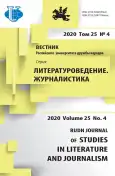Женские образы на историческом фоне: победа оманской писательницы Джохи аль-Харти в The Man Booker International Prize - 2019
- Авторы: Зарытовская В.Н.1, Аль-Рахби А.М.1
-
Учреждения:
- Российский университет дружбы народов
- Выпуск: Том 25, № 4 (2020)
- Страницы: 692-704
- Раздел: Литературоведение
- URL: https://journal-vniispk.ru/2312-9220/article/view/318815
- DOI: https://doi.org/10.22363/2312-9220-2020-25-4-692-704
- ID: 318815
Цитировать
Полный текст
Аннотация
Статья посвящена путям развития литературы и в целом словесной культуры Омана с раннего Средневековья по сей день. Как по объективным, так и субъективным причинам оманская национальная литература до сих пор не становилась объектом исследований отечественных специалистов. Однако укрепление всесторонних, в том числе культурных отношений между нашими странами и признание современных оманских писателей международным литературным сообществом ставит необходимость подобного изыскания. Цель статьи заключалась в том, чтобы выделить те основные черты, которые были присущи словесному творчеству Омана на протяжении веков и долгое время составляли его своеобразие, перед тем как оманские писатели начали стремительно перенимать основные творческие тенденции Европы. Для этого, как наиболее известный материал, анализу было подвергнуто творчество родоначальника школы оманской поэзии поэта начала XX века Абу Муслима аль-Бахляни. Также была сделана попытка обозначить те стремительные изменения, которые произошли в литературной среде Омана за последние полстолетия, и ответить на вопрос, чем вызван интерес к литературе Залива сегодня. В рамках работы рассмотрен получивший в 2019 году международную премию роман Джохи аль-Харти «Небесные тела», представляющей сегодня женскую прозу Омана, которой в недалеком прошлом просто не существовало. Исследование позволяет сделать выводы о том, что оманская литература долгое время практически не переживала изменений в своей герметичной среде и приобрела отличительные, даже если говорить только о рамках Арабского мира, черты. А затем, с началом Оманского возрождения, сделала резкий рывок вперед и стала представлять интерес благодаря сочетанию актуальных художественных приемов и национального колорита, как в творчестве Джохи аль-Харти, чей последний роман переведен на два десятка языков.
Об авторах
Виктория Николаевна Зарытовская
Российский университет дружбы народов
Автор, ответственный за переписку.
Email: widaad@yandex.ru
кандидат педагогических наук, доцент кафедры иностранных языков факультета гуманитарных и социальных наук
Российская Федерация, 117198, Москва, ул. Миклухо-Маклая, д. 10, корп. 2Ахмед Мохаммед Аль-Рахби
Российский университет дружбы народов
Email: al_rakhbi_a@rudn.ru
кандидат филологических наук, ассистент кафедры иностранных языков факультета гуманитарных и социальных наук
Российская Федерация, 117198, Москва, ул. Миклухо-Маклая, д. 10, корп. 2Список литературы
- Ahmed Abdel Hamid Hussain. (2020, 8 February). al'iibadiat waljyusyas. eamman wamatifistu alwuquf eali alhiad [Ibadism and Geopolitics. Oman and Matifisto Standing on Neutrality]. Thmanuyah. Retrieved July 14, 2020, from https://thmanyah.com/3421/
- Zarytovskaya, V.N. (2011). Omanskij dialekt arabskogo yazyka: Istoriko-lingvisticheskoe opisanie [Omani dialect of the Arabic language: A historical and linguistic description]. Yazykovoj aspekt integracii i samoidentifikacii v sovremennom mire [The linguistic aspect of integration and self-identification in the modern world]: Collection of materials of the department scientific and methodological seminar (pp. 28-30). Moscow.
- Al-Harthi, J. (2010). sayidat alqumr [Celestial Bodies]. Beirut, Dar Al Adab.
- Omanobserver. (2019, November 14). Abu Muslim al. Bahlani among global influential figures: UNESCO. Retrieved May 11, 2020, from https://www.omanobserver.om/abu-muslim-al-bahlani-among-global-influential-figures-unesco/
- Al-Rahbi, A.M. (2006). Razvitie omanskoj poezii i ee rol' v formirovanii arabskoj kul'tury [Development of Omani poetry and its role in the formation of Arab culture]. Problemy i perspektivy vospitaniya yazykovoj kul'tury i formirovaniya yazykovoj lichnosti molodogo zhurnalista i filologa evrazijskogo prostranstva [Problems and prospects of linguistic culture upbringing and the formation of the linguistic personality of a young journalist and philologist of the Eurasian space]: Materials of the International scientific and practical conference (pp. 178-182).
- Al-Rahbi, S. (2002). qaws qazah alshra' [Desert rainbow]. Cologne: Camel Publications.
- Issa, S. (2016, 30 August). alshier aleumaniu almueasir [Contemporary Omani poetry]. Alfaisal. Retrieved July 5, 2020, from www.alfaisalmag.com/?p=2858
- Ruete E. (1907). Memoirs of an Arabian Princess. New York, Doubleday. Retrieved July 17, 2020, from http://digital.library.upenn.edu/women/ruete/arabian/arabian.html
Дополнительные файлы









